Turning Waste into Wealth: How Women and Youth Are Changing Their Lives in Kenya’s War on Plastic Pollution
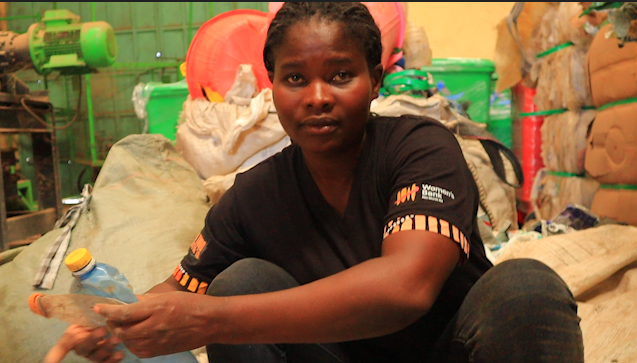
Each morning before sunrise, Gladys Wanjiku, a 39-year-old mother of two, walks through Kitengela’s dusty streets, markets, and residential areas with a large sack over her shoulder. She scans the ground for plastic bottles, food wrappers, and discarded packaging. For Gladys, this waste is more than just trash—it’s a lifeline.
Her hands, calloused and stained, dig through bins and trenches, sorting through layers of waste. Sometimes, children trail behind her—helping, watching, learning. It’s a scene repeated daily, a quiet act of survival and hope on the edges of a fast-growing town.
“For years, I struggled to find work,” she says, separating bottles from a heap of garbage near a dumpsite. “But collecting and selling plastics has allowed me to feed my family and send my children to school.”
On a good day, Gladys and others like her collect over 20 kilograms of plastics and earn around Ksh 600. On bad days—when it rains—they return empty-handed, exhausted and discouraged.
Kenya’s Plastic Crisis: A Growing Threat and Hidden Opportunity
Gladys’ daily hunt for plastics is part of a larger battle against Kenya’s growing waste crisis. The country consumes over 500,000 metric tons of plastic annually, generating 1 million tons of plastic waste—yet only 8–10% is recycled (UNEP, 2023). The rest clogs landfills, rivers, and oceans, with Nairobi River alone carrying microplastics in 90% of water samples (University of Nairobi, 2023).
Single-use packaging—food wrappers, bottles, and bags—accounts for 60% of this pollution, leaching toxins into soil and water, harming wildlife, and threatening human health. When burned—a common disposal method—plastics release carcinogens like dioxins. A 2022 Ministry of Health study linked prolonged exposure to respiratory diseases and hormonal disruptions, particularly among waste pickers.
Economically, Kenya loses Ksh 4 billion yearly in tourism and fisheries due to plastic-clogged beaches and lakes (NEMA, 2023). Yet, within this crisis lies an unexpected opportunity: a growing army of women and youth turning waste into income.
From Trash to Income
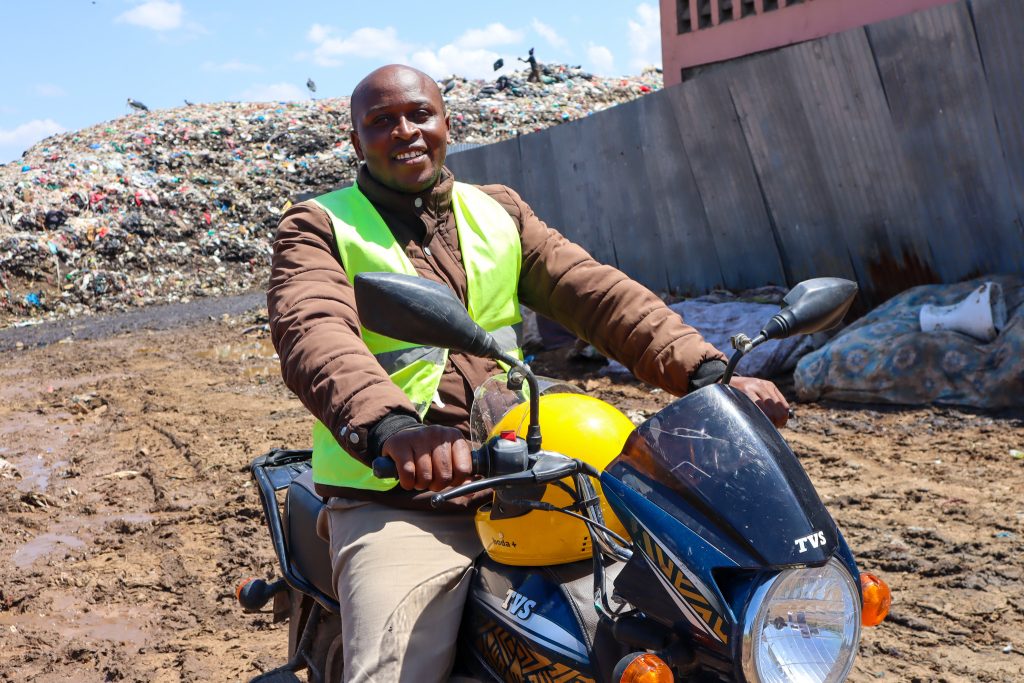
Dennis Cheruyot on the motorbike he purchased through his savings group—now earning extra income as a boda boda rider while continuing his waste collection work
For 30-year-old Dennis Cheruyot, waste picking was never part of his plans. Growing up in Kitengela, he dreamed of joining college, but financial constraints forced him to abandon his education. Struggling to survive, he turned to collecting and selling plastics—a decision that would ultimately change his life.
“I started alone, picking up plastic bottles to sell for a few shillings. It was tough, but I had no choice. Over time, I met others doing the same, and we decided to form a group,” Dennis recalls.
Together, they established Alliance Self-Help Group, a collective of waste pickers who pool their resources and support each other. Through their efforts, they collect over 500 kilograms of plastic waste a month, selling it in bulk to recyclers like TakaTaka Solutions.
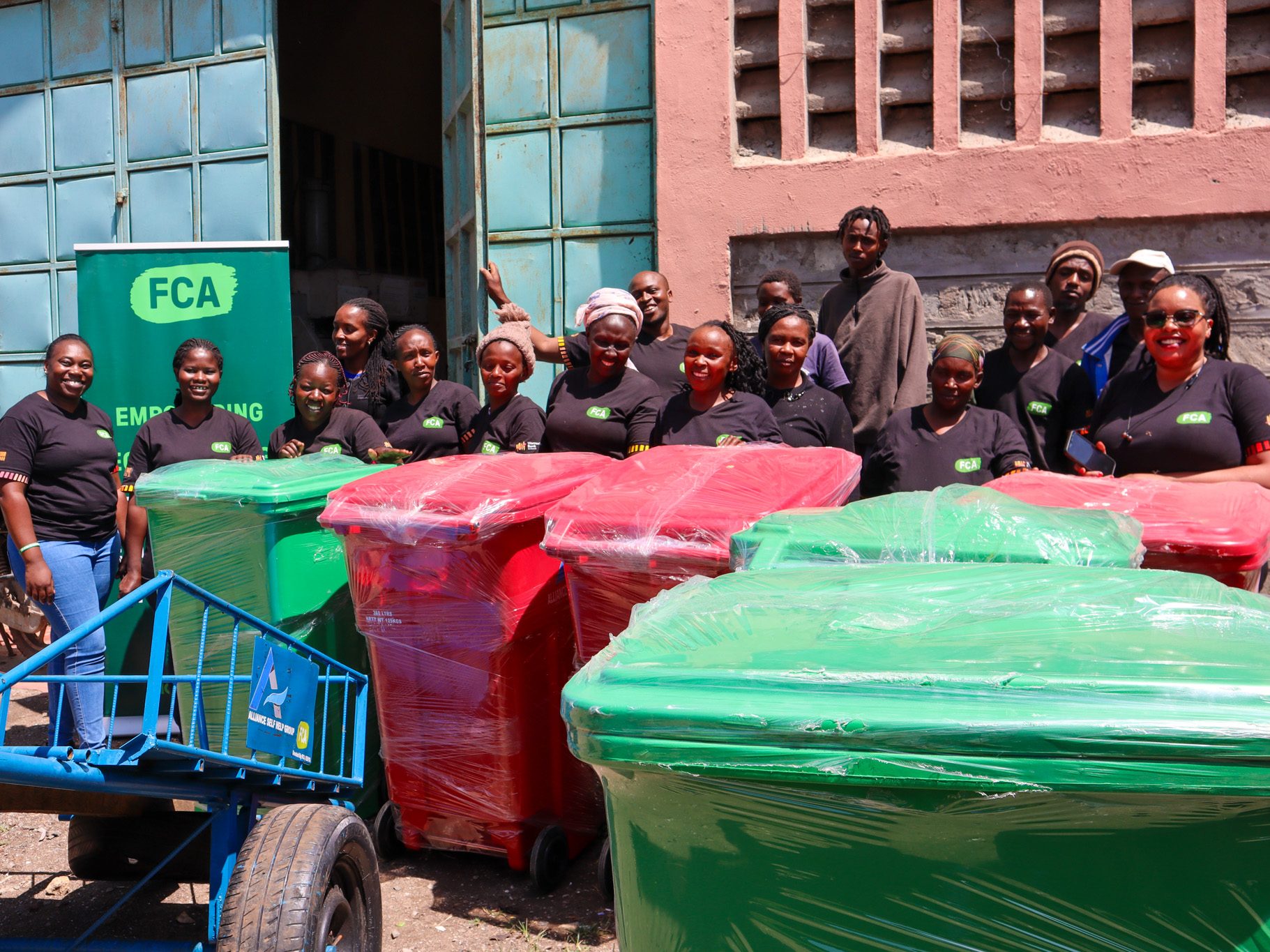
With support from FCA Kenya and the Women’s Bank, the group has received training in waste management, financial literacy, and entrepreneurship. Dennis even took out a small loan from their savings group to buy a motorbike for extra income.
“Now, I collect waste in the morning and do boda boda work in the afternoon,” he says with a smile. “This has doubled my earnings.”
The Gender Shift in Waste Work
Traditionally, waste picking in Kenya has been dominated by men. But more and more women—like Mercy Kamene—are stepping up and transforming the landscape.
Mercy, chairlady of the Alliance Self-Help Group, began collecting plastic in 2020 after losing her job. “I was desperate,” she says. “But through this work, I’ve been able to educate my children and start a pig-rearing business. I now aspire to promote environmental conservation by venturing into the e-waste business.”
Mercy and her group cover residential estates, open-air markets, and other busy zones, collecting over 500 kilograms of plastic waste each month. But the work isn’t easy—long hours, extreme weather, and harassment from authorities are all part of the job. A lack of personal protective equipment (PPE) once left Mercy vulnerable to injury. Low prices for waste created a cycle of financial instability, making it hard to save or invest.
Everything changed when she joined the Business from Waste project. Mercy now works safely with proper PPE and has received GSLA training in financial management, savings, and entrepreneurship. She also learned to recognise and support mental health—both in herself and in her group.
“Our dream is to open our own recycling plant,” she says proudly. “We want to control the value chain.”
Building a Circular Economy
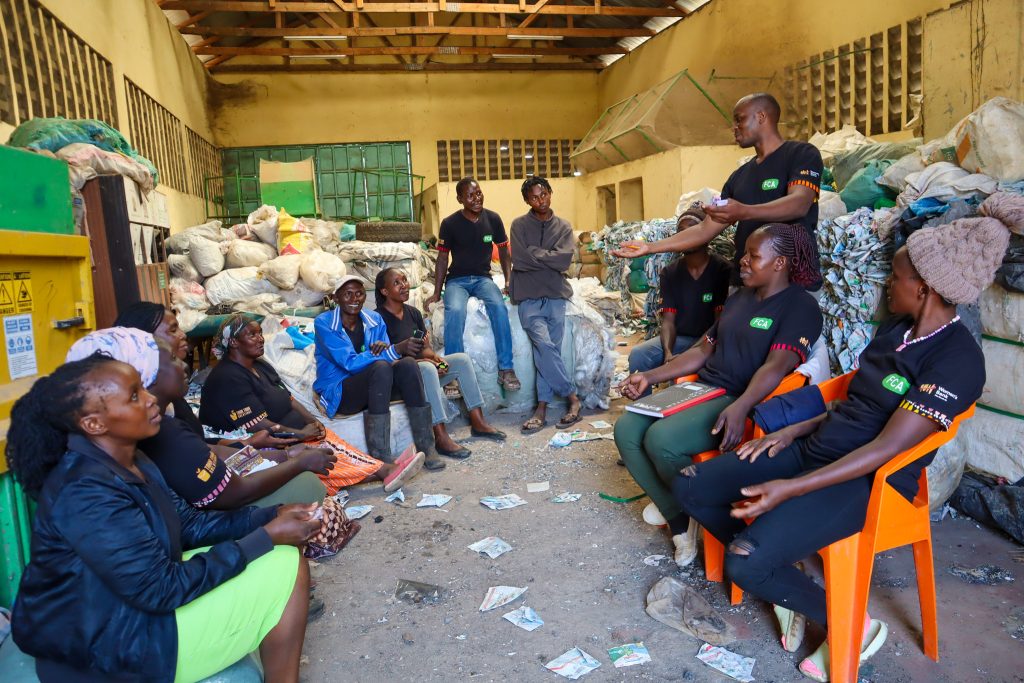
Mercy’s transformation didn’t happen in isolation. It’s part of a quiet revolution being driven by organisations like FCA Kenya, which has turned plastic waste into a pathway out of poverty for hundreds of women and youth across five counties. Thanks to Women’s Bank funding.
“Before, we were invisible,” says Mercy, adjusting her branded safety vest during a break at the Alliance Group’s sorting site. “Now we have scales to weigh our collections, contracts with recyclers, and even childcare so our babies aren’t breathing dump fumes.” The numbers reveal the scale of change: 80% of trainees are women, each accessing financial literacy training, startup kits, and—most crucially—a fair price for their labor.
Selestine Omboga, FCA’s Program Support Officer, watches Mercy’s group negotiate with a waste picker buyer and smiles. “Women waste pickers don’t just carry sacks—they carry families. While men compete for high-value waste in dumps, women dominate household collections while managing childcare and societal shame. We’ve set up childcare centre so they can work without worry —it’s the reason mothers can finally meet their daily collection targets.
The project also promotes access to start-up kits, linking waste workers to formal markets and helping them transition from survival work to sustainable entrepreneurship.
Scaling Up Waste Innovation
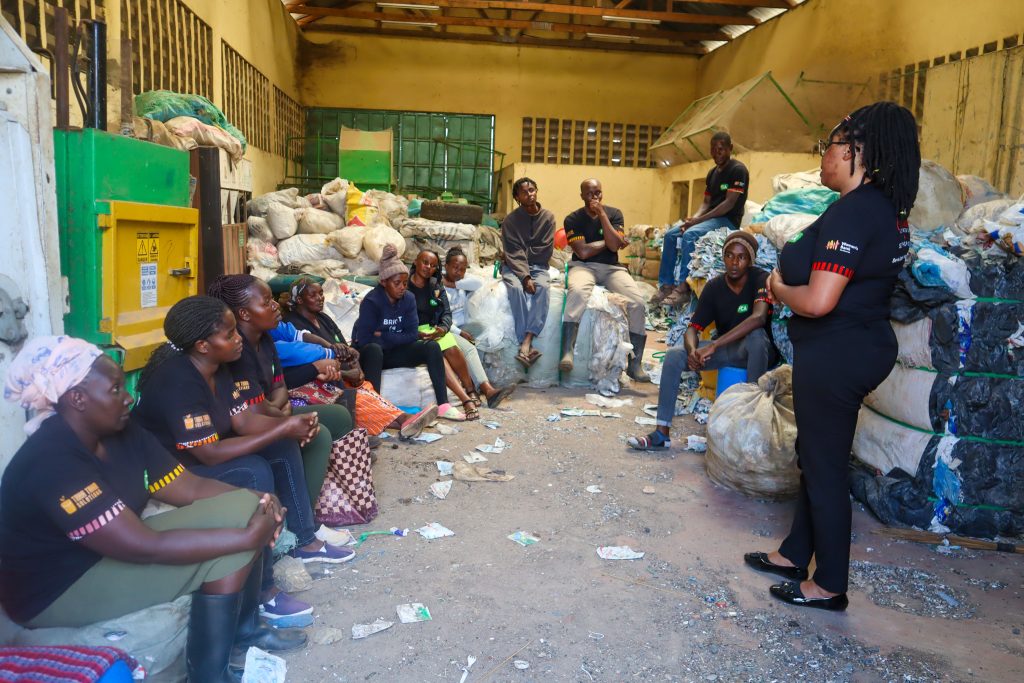
While FCA focuses on training and support waste pickers, private companies like TakaTaka Solutions are transforming this grassroots hustle into a formalised supply chain. The Kiambu-based waste management company processes 60 tonnes of waste daily through an innovative model that directly benefits waste pickers.
“We train and equip 1,400 waste pickers—1,000 of them women—paying Ksh 25 per kilogram,” explains Debbie Maina, TakaTaka solutions’s project coordinator. The collected plastic gets shredded into pellets for export, creating value from what was once considered worthless.
Yet challenges persist. “Only 15% of Nairobi’s waste pickers are formalised,” Maina notes. “When waste isn’t properly sorted at the household level, our recycling costs increase significantly. County governments need to enforce waste separation policies to make this system work for everyone.”
Policy Shifts and the Future of Waste Work
Kenya was one of the first African countries to ban single-use plastic bags in 2017 and later prohibited plastic bottles in protected areas. But enforcement remains patchy, especially in rural and border towns.
Faith Nasiku, a county social services officer, notes growing recognition of waste pickers’ importance: “Government and community leaders are finally seeing these workers as valuable partners in waste management.” We urge more donors to support these waste picker groups to expand their opportunities and reduce gender-based violence (GBV).”
A Call to Action
The next time you discard plastic, remember: in the hands of women like Gladys and Mercy, it becomes school fees, business capital, and hope. Support waste pickers, advocate for better policies, and be part of the solution.
Related stories: Dandora, the infinite landfill where plastic is a way of subsistence
Text: Daisy Obare